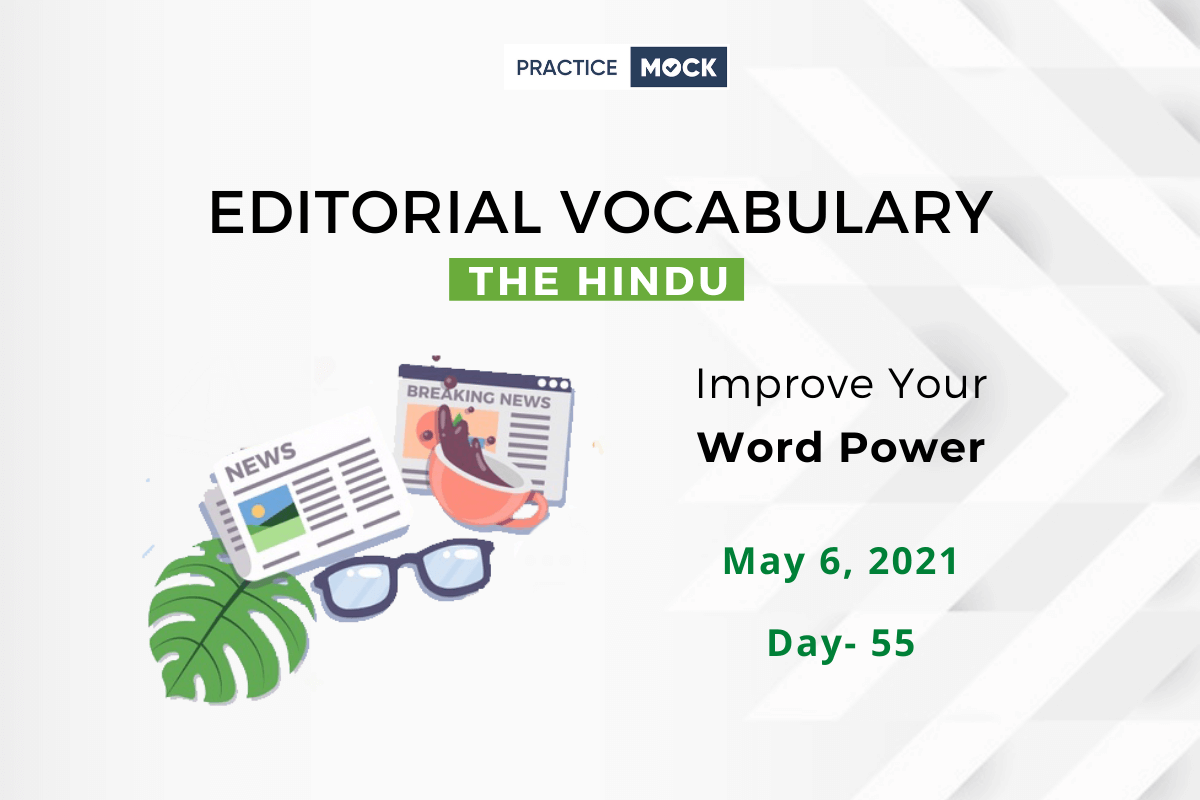We hope that these editorial articles are helping you in your exam preparation. This series of Editorials’ Difficult Words will help you to understand the editorials of The Hindu in a better way. Today we have come up with the explanation of difficult words/phrases of the below editorial. Have a look and update your word power & general awareness.
| Difficult Word/ Phrase | Contextual Meaning |
| Ceiling | an upper limit |
| Strike down | to decide that a law is illegal and should not apply |
| Underscore | emphasizing the importance of something |
| Adhere | believe in and follow the practices of |
| Unpalatable | difficult to put up with or accept |
| Set aside | declare a legal decision or process to be invalid |
| Limb | a branching section |
| Denude | to deprive of something important |
| Clamour | a demand for something |
| In the offing | likely to happen or appear soon |

Against excess: On Maratha quota
In Maratha case, SC holds fast to quota ceiling (an upper limit) and requires special reasons to exceed it
In striking down (to decide that a law is illegal and should not apply) the separate reservation given to Maharashtra’s Maratha community, the Supreme Court has underscored (emphasizing the importance of something) the importance of adhering (believe in and follow the practices of) to the 50% limit on total reservation, as well as the need to justify any excess by showing the existence of exceptional circumstances. In a decision that will be quite unpalatable (difficult to put up with or accept) to mainstream parties, the Court has not only found no merit in the Maratha claim to backwardness but also said the community is adequately represented in public services. It is no surprise that the Maratha quota, given by Maharashtra through a 2018 law, did not survive judicial scrutiny by a Constitution Bench. The 16% quota in admissions to educational institutions and jobs in public services — later brought down to 12% in admissions and 13% in jobs through a 2019 amendment — took the total reservation in the State beyond the 50% ceiling imposed by earlier verdicts. The five-Judge Bench has held that the State has not shown any exceptional circumstance to justify exceeding the limit. The Bombay High Court had upheld the validity of the Maratha reservation in principle, but ruled that the law could not have fixed the percentage above what was recommended by the State Backward Classes Commission headed by M.G. Gaikwad. The Court has now set aside (declare a legal decision or process to be invalid) this ruling, rejecting the HC’s reasoning that the denial of backward class status to the Marathas had pushed them deeper into social and educational backwardness, and that this constituted a special circumstance in support of their claim to separate reservation.

The second limb (a branching section) of the judgment, however, may cause political concern. The Court’s categorical refusal to reconsider the 50% limit set down by a verdict in Indra Sawhney (1992) may threaten the continuance of different kinds of reservation in States. The Court’s interpretation of the 102nd Constitution Amendment, by which a National Commission for Backward Classes was created, has proved right fears that the national body’s role and power may impact the rights of States. The Court has ruled that, henceforth, there will only be a single list of socially and educationally backward classes with respect to each State and Union Territory notified by the President of India, and that States can only make recommendations for inclusion or exclusion, with any subsequent change to be made only by Parliament. Several MPs had argued that the Amendment would denude (to deprive of something important) the States of their power, but the Centre had assured them that it was not so. The Court has now ruled that Parliament’s intent was to create a scheme to identify SEBCs in the same manner as SCs and STs. The President alone, to the exclusion of all other authorities, is now empowered to identify SEBCs. A clamour (a demand for something) for yet another constitutional amendment to undo the effect of this verdict may be in the offing (likely to happen or appear soon).
Hope you got to know some new words/phrases which will definitely be useful in the English section of upcoming competitive exams. Wishing you all the best for your preparation!
Want to improve your vocabulary further? Download the Lists of Word-Meanings of Previous Months here.

- Sign Up on Practicemock for Updated Current Affairs, Free Topic Tests and Free Mini Mocks
- Sign Up Here to Download Free Study Material
Free Mock Tests for the Upcoming Exams
- IBPS PO Free Mock Test 2024
- RBI Grade B Free Mock Test 2024
- IBPS SO Free Mock Test 2024
- NABARD Grade A Free Mock Test 2024
- SSC CGL Free Mock Test 2024
- IBPS Clerk Free Mock Test 2024
- IBPS RRB PO Free Mock Test 2024
- IBPS RRB Clerk Free Mock Test 2024
- RRB NTPC Free Mock Test 2024
- SSC MTS Free Mock Test 2024
- SSC Strenographer Free Mock Test 2024
- GATE Mechanical Free Mock Test 2024
- GATE Civil Free Mock Test 2024
- RRB ALP Free Mock Test 2024
- SSC CPO Free Mock Test 2024
- AFCAT Free Mock Test 2024
- SEBI Grade A Free Mock Test 2024
- IFSCA Grade A Free Mock Test 2024
- RRB JE Free Mock Test 2024
- Free Banking Live Test
- Free SSC Live Test



